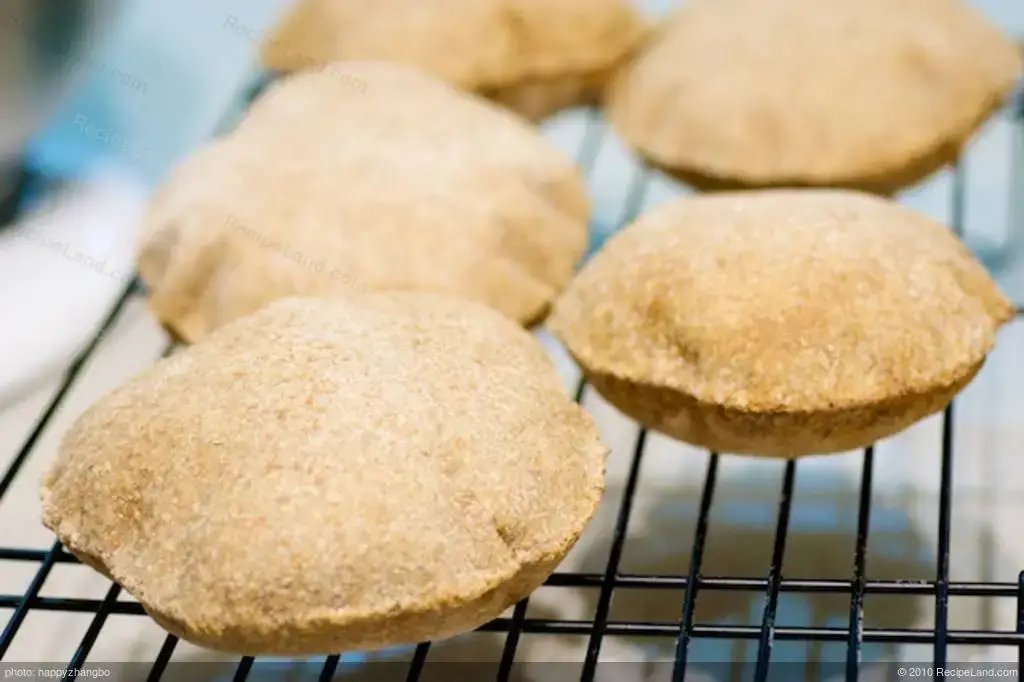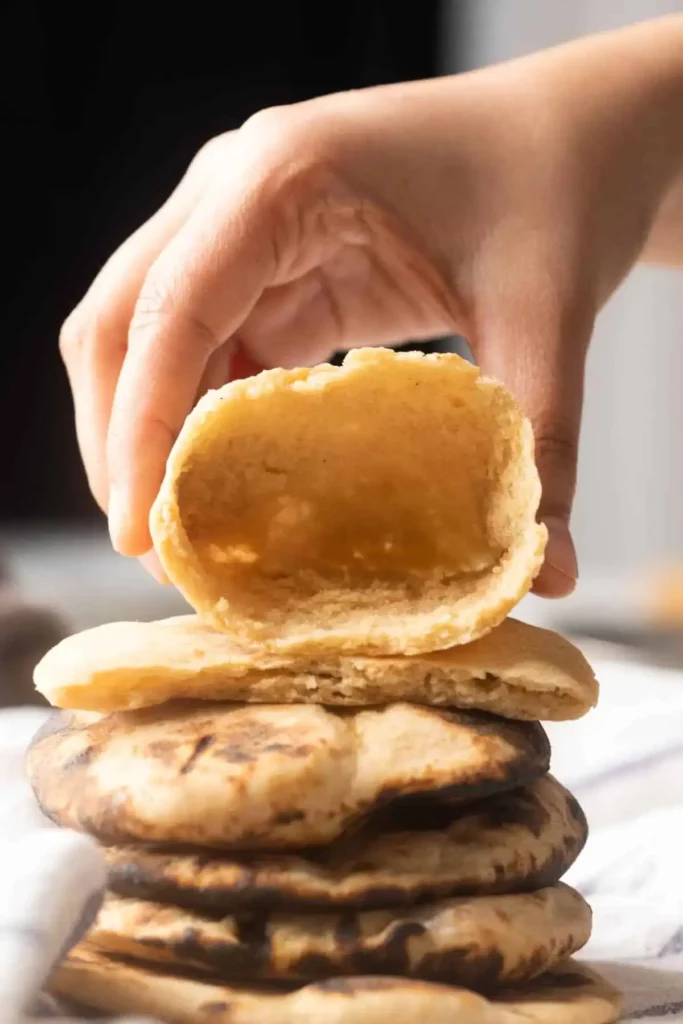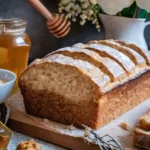Are you ready to experience the freedom of delicious, homemade whole wheat pita bread? Say goodbye to store-bought versions filled with preservatives and hello to a healthier, tastier alternative.
In just a few simple steps, you can create your own 100 Percent Whole Wheat Pita Bread Recipe that is soft, fluffy, and perfect for all your favorite fillings.
With this recipe, you’ll have the satisfaction of knowing exactly what’s in your pita bread, giving you the freedom to enjoy every bite.
Contents
- 1 Key Takeaways
- 2 Why Choose Whole Wheat Flour for Pita Bread
- 3 Essential Ingredients for Homemade Pita Bread
- 4 Step-by-Step Instructions for Kneading and Proofing the Dough
- 5 100 Percent Whole Wheat Pita Bread Recipe
- 6 How to Achieve the Perfect Puff in Your Pita Bread
- 7 Tips for Storing and Reheating Whole Wheat Pita Bread
- 8 Delicious Serving Ideas for Your Homemade Pita Bread
- 9 Frequently Asked Questions
- 10 Can I Use Whole Wheat Pita Bread in Place of Corn Bread for This Recipe?
- 11 Conclusion
Key Takeaways
- Whole wheat flour is a healthier and more nutritious choice for pita bread.
- Whole wheat flour has a lower glycemic index and is beneficial for managing blood sugar levels and weight loss.
- All-purpose flour or gluten-free flour blends do not offer the same nutritional benefits as whole wheat flour.
- Proper kneading, proofing, and cooking techniques are essential for achieving the perfect texture and taste of homemade whole wheat pita bread.
Why Choose Whole Wheat Flour for Pita Bread
You should choose whole wheat flour for pita bread because it’s healthier and provides more nutrients. Whole wheat flour contains the bran, germ, and endosperm of the wheat kernel, making it a rich source of fiber, vitamins, and minerals. These nutrients are important for maintaining good health and preventing chronic diseases, such as heart disease and type 2 diabetes.
The benefits of whole wheat flour extend beyond its nutritional content. It has a lower glycemic index compared to refined flour, meaning it causes a slower and steadier rise in blood sugar levels. This makes it a better choice for individuals who are managing their blood sugar levels or trying to lose weight.
While there are alternatives to whole wheat flour, such as all-purpose flour or gluten-free flour blends, they don’t offer the same nutritional benefits. So, if you want to maximize the health benefits of your pita bread, whole wheat flour is the way to go.
Essential Ingredients for Homemade Pita Bread
What are the essential ingredients for making homemade pita bread?
When it comes to making pita bread at home, there are a few key ingredients you’ll need. These ingredients are crucial to achieving that perfect texture and taste. Here are the essential ingredients for homemade pita bread:
- Whole wheat flour: Opt for whole wheat flour instead of white flour to make your pita bread healthier. Whole wheat flour contains all parts of the grain, providing more fiber, vitamins, and minerals than white flour.
- Water: Water is essential for hydrating the dough and activating the yeast, which helps the pita bread rise.
- Yeast: Yeast is responsible for the fermentation process, giving the pita bread its light and fluffy texture.
- Salt: Salt not only enhances the flavor of the pita bread but also helps to control the fermentation process.
Step-by-Step Instructions for Kneading and Proofing the Dough
To begin kneading and proofing the dough, first, combine the ingredients in a large mixing bowl. Use your hands or a wooden spoon to mix the ingredients until a rough dough forms. Once the ingredients are fully incorporated, transfer the dough onto a lightly floured surface.
Begin kneading the dough by pressing it down and away from you with the heel of your hand. Fold the dough back onto itself and repeat the process. Kneading helps develop the gluten in the dough, giving it structure and elasticity. Continue kneading for about 8-10 minutes, or until the dough becomes smooth and elastic.
After kneading, shape the dough into a ball and place it in a greased bowl. Cover the bowl with a clean kitchen towel and let the dough proof in a warm, draft-free area for about 1 hour, or until it has doubled in size.
These kneading techniques and proofing tips will ensure that your pita bread dough is perfectly prepared for baking.
100 Percent Whole Wheat Pita Bread Recipe
Course: SnackCuisine: MediterraneanDifficulty: Intermediate8
1
hour39
150
kcalElevate your snack game with this 100 percent whole wheat pita bread recipe. A wholesome, flavorful option for any occasion, these pitas are perfect for dipping or filling with your favorite ingredients.
Ingredients
2 cups whole wheat flour
1 teaspoon salt
1 teaspoon honey
1 tablespoon olive oil
1 cup warm water
2 1/4 teaspoons active dry yeast
Directions
- In a bowl, mix warm water, honey, and yeast. Allow it to sit for 5-10 minutes until frothy.
- In a large bowl, combine whole wheat flour and salt. Make a well in the center and pour in the yeast mixture.
- Knead the dough until smooth, then let it rise in a greased bowl for 45-60 minutes.
- Preheat the oven to 475°F (245°C) with a baking sheet inside.
- Divide the dough into 8 portions, roll each into a ball, and flatten into rounds.
- Place the rounds on the hot baking sheet and bake for 3 minutes or until they puff up.
- Cool slightly and enjoy your homemade whole wheat pita bread!
How to Achieve the Perfect Puff in Your Pita Bread
To achieve the perfect puff in your pita bread, there are a few key points to keep in mind.
First, the hydration of the dough is crucial. Aim for a slightly sticky texture to ensure a light and fluffy result.
Secondly, high heat is essential for creating the necessary steam that will cause the pita to puff. Preheating your oven or skillet at a high temperature is important for achieving this.
Lastly, be mindful of the cooking time. Overcooking can lead to a dry and dense pita, so remove it from the heat as soon as it has puffed and developed a golden brown color.
Dough Hydration for Puff
You’ll need to adjust the hydration of your dough to achieve the perfect puff in your pita bread. The consistency of your dough plays a crucial role in creating those iconic air pockets. Here are four key factors to consider when hydrating your dough:
- Water to flour ratio: Increasing the hydration level by adding more water will result in a lighter and puffier pita bread.
- Mixing time: Properly mixing the dough allows the water to fully hydrate the flour, ensuring a more consistent texture.
- Resting time: Allowing the dough to rest before baking enables the gluten to relax, making it easier for the bread to puff up.
- Baking temperature: A high heat oven is essential for creating the perfect puff. The intense heat causes the water in the dough to rapidly turn into steam, causing the bread to expand.
By adjusting these factors, you can achieve the ideal dough consistency and baking temperature necessary for achieving that deliciously puffy pita bread.
Now, let’s dive into the importance of high heat in the subsequent section.
Importance of High Heat
With high heat, you can achieve the perfect puff in your pita bread. High heat benefits the pita bread by creating a quick and intense burst of heat, which is essential for the dough to puff up properly. When exposed to high heat, the moisture in the dough turns into steam, causing the dough to rise and create that characteristic pocket in the center of the pita bread.
To achieve the perfect puff, it’s important to preheat your oven to a high temperature, usually around 500°F (260°C). Additionally, using a baking stone or a preheated baking sheet can help to evenly distribute the heat and promote a more even rise.
Proper Cooking Time
Achieving the perfect puff in your pita bread requires carefully monitoring its cooking time. To ensure that your pita bread rises beautifully, follow these guidelines:
- Cooking temperature: Preheat your oven to a high temperature, around 500°F (260°C). The intense heat will create the necessary steam inside the dough to facilitate the puffing process.
- Dough consistency: Make sure your dough is soft and elastic. It shouldn’t be too dry or too wet. The right consistency will allow the dough to expand and create the characteristic pocket in the center of the pita bread.
- Timing: Bake the pita bread for approximately 3-4 minutes, or until it puffs up and turns golden brown. Keep a close eye on it to prevent overcooking, as this can result in a dry and tough texture.
- Storage: Once cooked, let the pita bread cool completely before storing it in an airtight container to maintain its softness and freshness.
By paying attention to the cooking temperature and dough consistency, you can achieve perfectly puffed and delicious pita bread every time.
Enjoy the freedom of savoring your homemade pita bread with various fillings and spreads.
Tips for Storing and Reheating Whole Wheat Pita Bread
To ensure the best reheating results for your whole wheat pita bread, it’s important to use the right methods.
One recommended method is to lightly dampen the pita bread with water before reheating it in a toaster or oven to help restore its moisture and softness.
Another option is to wrap the pita bread in aluminum foil and warm it in a preheated oven at 350°F for a few minutes.
For long-term storage, keep the pita bread in an airtight container or freezer bag in the refrigerator for up to 1 week, or freeze it for up to 3 months for optimal freshness.
Best Reheating Methods
When reheating your whole wheat pita bread, ensuring freshness is key. Here are some best reheating methods to help you enjoy your pita bread just like it came out of the oven:
- Toaster Oven: Preheat your toaster oven to 350°F (175°C). Place your pita bread directly on the oven rack and heat for 3-5 minutes until warm and slightly crispy.
- Microwave: Wrap your pita bread in a damp paper towel and microwave on high for 10-20 seconds. This will help retain moisture and prevent the bread from drying out.
- Stovetop: Heat a non-stick skillet over medium heat. Place your pita bread in the skillet and heat for 1-2 minutes on each side until warm and lightly toasted.
- Grill: Preheat your grill to medium heat. Brush your pita bread with a little olive oil and grill for 1-2 minutes on each side until warm and slightly charred.
Long-Term Storage Options
You can store your whole wheat pita bread for long-term and easily reheat it using simple tips and techniques.
When it comes to long-term storage options for whole wheat pita bread, proper shelf life management is key. To extend the shelf life of your pita bread, it’s important to store it in an airtight container or freezer bag. This will help prevent moisture and air from getting in, which can cause the bread to become stale or moldy. Additionally, placing the pita bread in the freezer can significantly prolong its shelf life.
When you’re ready to enjoy your pita bread, simply remove it from the freezer and let it thaw at room temperature. To reheat, you can either warm it up in a toaster, oven, or on a skillet.
Delicious Serving Ideas for Your Homemade Pita Bread
Get creative with your homemade pita bread by trying these delicious serving ideas:
- Mediterranean Wrap: Fill your pita bread with grilled chicken, fresh vegetables, and a drizzle of tzatziki sauce for a flavorful and healthy meal.
- Breakfast Pita: Stuff your pita bread with scrambled eggs, crispy bacon, and melted cheese for a quick and satisfying breakfast on the go.
- Falafel Sandwich: Spread some hummus inside your pita bread and add homemade falafel, lettuce, tomatoes, and a sprinkle of tahini sauce for a Middle Eastern-inspired sandwich.
- Caprese Pita: Layer sliced tomatoes, fresh mozzarella cheese, and basil leaves inside your pita bread. Drizzle with balsamic glaze for a refreshing and light lunch option.
These serving suggestions will help you explore the versatility of your homemade pita bread. Whether you prefer savory or sweet fillings, the options are endless. Let your taste buds guide you and enjoy the freedom to experiment with different combinations.
Frequently Asked Questions
How Many Calories Are in a Serving of Whole Wheat Pita Bread?
In a serving of whole wheat pita bread, the number of calories can vary depending on the size of the pita. However, on average, a small whole wheat pita contains around 80-100 calories.
Can I Substitute All-Purpose Flour for Whole Wheat Flour in This Recipe?
Can you substitute all-purpose flour for whole wheat flour in this recipe? While all-purpose flour may work, using whole wheat flour provides more nutritional benefits, such as higher fiber content and added vitamins and minerals.
Can I Freeze the Dough for Later Use?
Yes, you can freeze the dough for later use. Freezing the dough will allow you to store it for a longer period of time without it going bad. Just make sure to properly wrap it before freezing.
How Long Does It Take to Proof the Dough?
Proofing time for the dough varies depending on the recipe. While it’s important to follow the specific instructions, using alternative flours may affect the time needed for the dough to rise.
Can I Use a Bread Machine to Knead the Dough for This Recipe?
Yes, you can use a bread machine to knead the dough for this recipe. Using a bread machine can save time and effort. Simply follow the instructions provided by your machine and enjoy homemade whole wheat pita bread.
Can I Use Whole Wheat Pita Bread in Place of Corn Bread for This Recipe?
Yes, you can use whole wheat pita bread in place of cornbread for this Albers cornbread recipe. Simply substitute the cornbread with an equal amount of pita bread, and adjust the cooking time as needed. The whole wheat pita bread will add a unique twist to the traditional recipe.
Conclusion
In conclusion, making homemade 100 percent whole wheat pita bread is a nutritious and delicious choice. Did you know that whole wheat flour contains all parts of the grain, including the bran, germ, and endosperm, making it a good source of fiber and nutrients?
By following the step-by-step instructions and tips provided, you can easily achieve the perfect puffed pita bread that can be enjoyed in various ways.
Start baking your own healthy pita bread today!




